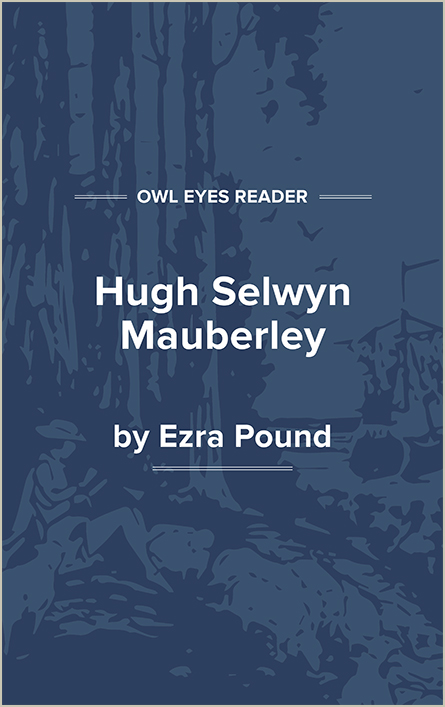Study Guide
Summary
The American poet Ezra Pound had been living in Europe for more than a decade when he published his first major work, Hugh Selwyn Mauberley. In London, Pound became professionally acquainted with many of the leading artists and intellectuals, including the novelists Wyndham Lewis and Ford Madox Ford; the critic T. E. Hulme; poets T. S. Eliot, Hilda Doolittle, Amy Lowell, and John Gould Fletcher; and the sculptor Henri Gaudier-Brzeska. Pound also met Henry James and helped the Anglo-Irish poet W. B. Yeats hone a fresh style for what many saw to be the new age of literature. In addition to writing poetry, Pound was active as an editor for such innovative literary magazines as Poetry, Egoist, and Blast. Among his lasting contributions are Imagism and the experimentation with free verse.
Pound was in a unique position to bear painful witness to two equally devastating phenomena. The first was the utter indifference with which society at large greeted the efforts of young people to improve human values and perceptions through their art. The second phenomenon was World War I. Hugh Selwyn Mauberley is a double-edged indictment of that war, which changed everything, and of the poets and the artists who failed to change anything. Nevertheless, Hugh Selwyn Mauberley is also that very thing whose absence the poet mourns—a poetry that has the courage to present a true report without forsaking beauty.
The first three sections of the poem rely heavily on allusions to the classical age of Homeric Greece to establish a stark contrast between past and contemporary expectations of art and the artist. Pound emphasizes this point further through the dashed expectations of his alter ego, Mauberley. Pound later told a correspondent, “I am no more Mauberley than Eliot is Prufrock. . . . Mauberley is a mere surface.” Still, Pound’s dedication to the poem indicates it is “an ode for the choice of his [own] tomb,” and like Pound, who was born in Idaho, Mauberley is an American “born/ in a half savage country.” As an alter ego, Mauberley most likely represents a former self who failed by setting himself the unachievable goal “to resuscitate the dead art/ Of poetry.”
Mauberley is not wrong to aim so high, the poet tells us, but he compares it to trying to wring “lilies from the acorn.” Thus, he eventually becomes lost and forgotten in his own aesthetic subtleties, just as Homer’s Odysseus got wrapped up in the “elegance of Circe’s hair.” In any case, the “age demanded” other things from its artists, “an image/ Of its accelerated grimace/ / . . . a mould in plaster,/ Made with no loss of time.” While artists labored fruitlessly at what the age regarded as meaningless nothings, “a tawdry cheapness” set the standard for public taste, and the classical vitality of Sappho, Dionysus, and the Faun was replaced by “a knave or an eunuch” hypocritically mouthing Christian pieties until, instead of the crowning laurel for the heroes and gods of old, there was but a “tin wreath.”
All of this would be nothing more than the commonplaces of social criticism that poets have, since time immemorial, leveled at their ages were it not for the witheringly real intervention of World War I. It is to the bitter ironies of that event that the poet directs his attention in parts 4 and 5. “These fought in any case,” he writes in stark terms, and yet for what did they fight and die. Amid the melodrama of Mauberley’s failures and of the age’s cheapness of mind and values there was only “wastage as never before,” and now when the poet quotes from the classics it is to remind his readers that to die for one’s country is neither fitting nor sweet if that nation is the contemporary England (or France, Germany, or the United States) that was described in parts 2 and 3.
In Hugh Selwyn Mauberley , Pound discards the free verse techniques he developed in the preceding decade, returning in parts 1 through 3 to the traditional...
(The entire page is 1,614 words.)
Owl Eyes subscribers get unlimited access to our expert annotations, analyses, and study guides on your favorite texts. Master the classics for less than $5/month!

